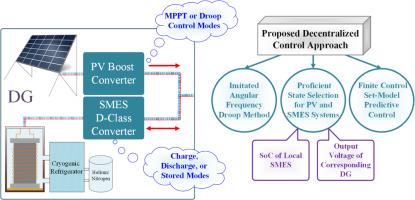在由 SMES 和光伏系统组成的直流微电网中应用模仿频率下降技术和预测控制以实现功率共享
IF 3.3
3区 工程技术
Q2 ENGINEERING, ELECTRICAL & ELECTRONIC
引用次数: 0
摘要
本文介绍了一种高效的分散控制方法,适用于由光伏(PV)和超导磁储能(SMES)系统组成的独立环形总线低压直流(DC)微电网。所提出的方法解决了三个具有挑战性的问题:内部控制环对瞬态和稳态性能的影响、功率共享和运行模式选择。由于作为直流-直流转换器内部控制环的传统比例-积分(PI)控制器响应缓慢且不稳定,因此针对光伏升压和 SMES D 级转换器设计了采用精确离散化方法的有限控制集-模型预测控制(FCS-MPC)方案。此外,通过修改交流微电网中的经典下垂控制方法,提出了一种模仿角频率下垂方法,用于环形总线低压直流微电网中的功率共享和电压稳定。通过利用本地 SMES 的 SoC 和相应 DG 的输出电压,所提出的精通状态选择 (PS2) 策略可有效确定 PV-SMES 运行模式。在 MATLAB/SIMULINK 中对负载变化、光伏系统辐照度变化、运行模式转换、拓扑变化和 DG 停机条件下进行的仿真研究证实,与采用脉宽调制 (PWM) 方法的传统 PI 控制器相比,所提出的基于 MPC 的方法在精确电压调节、分布式发电 (DG) 之间的功率共享以及最大限度地减少这些干扰和不确定性的影响方面非常有效。本文章由计算机程序翻译,如有差异,请以英文原文为准。

Application of imitated frequency droop technique and predictive control for power sharing in DC microgrid comprising SMES and PV systems
This paper represents an efficient decentralized control approach for standalone ring-bus low-voltage direct current (DC) microgrids comprising photovoltaic (PV) and superconducting magnetic energy storage (SMES) systems. The proposed method addresses three challenging issues; effects of inner control loop on transient and steady-state performance, power sharing, and operating mode selection. Since the conventional proportional-integral (PI) controllers as internal control loop of DC-DC converters provide slow and unstable response, finite control set-model predictive control (FCS-MPC) schemes with exact discretization method are designed for PV boost and SMES D-class converters. Furthermore, by modifying the classic droop control method in alternating current (AC) microgrids, an imitated angular frequency droop method is presented for power sharing and voltage stabilization in ring-bus low-voltage DC microgrid. The proposed proficient state selection (PS2) strategy effectively determines PV-SMES operating modes by utilizing the SoC of local SMES and the output voltage of corresponding DG. Simulation studies performed in MATLAB/SIMULINK under load change, irradiance variation of PV system, operating mode transition, topology change, and DG outage conditions confirm the effectiveness of the proposed MPC-based approach in accurate voltage regulation, power sharing among distributed generations (DGs), as well as minimizing the effects of these disturbances and uncertainties compared to conventional PI controllers with pulse-width modulation (PWM) method.
求助全文
通过发布文献求助,成功后即可免费获取论文全文。
去求助
来源期刊

Electric Power Systems Research
工程技术-工程:电子与电气
CiteScore
7.50
自引率
17.90%
发文量
963
审稿时长
3.8 months
期刊介绍:
Electric Power Systems Research is an international medium for the publication of original papers concerned with the generation, transmission, distribution and utilization of electrical energy. The journal aims at presenting important results of work in this field, whether in the form of applied research, development of new procedures or components, orginal application of existing knowledge or new designapproaches. The scope of Electric Power Systems Research is broad, encompassing all aspects of electric power systems. The following list of topics is not intended to be exhaustive, but rather to indicate topics that fall within the journal purview.
• Generation techniques ranging from advances in conventional electromechanical methods, through nuclear power generation, to renewable energy generation.
• Transmission, spanning the broad area from UHV (ac and dc) to network operation and protection, line routing and design.
• Substation work: equipment design, protection and control systems.
• Distribution techniques, equipment development, and smart grids.
• The utilization area from energy efficiency to distributed load levelling techniques.
• Systems studies including control techniques, planning, optimization methods, stability, security assessment and insulation coordination.
 求助内容:
求助内容: 应助结果提醒方式:
应助结果提醒方式:


